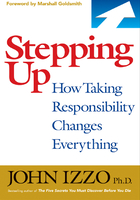Sharing Risk, Increasing Initiative
ESSENTIALS
Many leaders act as though it all rests on their shoulders.
The more you take on yourself, the more likely it is that people will defer to your authority, delegate upward, and wait to be told what to do.
Citing dependency as an excuse for tightening control is the world's oldest self-fulfilling prophecy. You will always get more of what you don't want.
You can overturn this convention by giving coordination and control to the people doing the work.
The advanced skill is discovering how much you can give away and what happens when you do it.
In this chapter we will help you discover if you are ready.
DEPENDENCY COMES NATURALLY; RESPONSIBILITY MUST be learned. So much in us works against our taking responsibility. We are born dependent and grow up deferring to authority. Faced with ambiguity, we sink into self-doubt. Asking leaders to decide for us is as natural as breathing. It should be obvious that the collective knows more about how a system works than any leader. People rarely know the significance of what they know. They can gain an understanding of the whole only by interacting with one another.
A shipping company invited the Danish social scientist Gunnar Hjelholt to help design a new work system for a state-of-the-art oil tanker. The goals were less stress, fewer accidents, and higher morale. Gunnar spent weeks at sea earning the crew's trust. Once he did they insisted he give them a design. He said he would help them create one. "Who," he asked, "is responsible for this ship?" (Madsen & Willert, 2006).
Each of us is the world's leading authority on his or her own experience. That is what Hjelholt taught the tanker crew, resulting in their most successful voyage ever. He did it by showing the crew that they already knew what to do and transferring to them the authority to do it.
Leaders in many cultures have proved the value of helping people take responsibility by tapping into their own experience. People you lead can accomplish much more in less time with greater enthusiasm when you put them in charge of themselves. We predict that after reading this chapter, you will be more mindful of how you can increase responsibility by giving it away. That's the easy part. What is unconventional is learning how to stay goal focused while helping others master unfamiliar behavior.
Six Principles of Sharing Responsibility
Here are six simple acts you can do to help people share responsibility for programs, projects, and decisions. All involve meetings. Because that is where you spend most of your time, you have new opportunities every day.
All People Do Their Best
We are convinced that whatever you see people do is the best they can do at that moment. If you want them to do better, change your behavior. To begin with, stop labeling people. It is so easy to jump to conclusions.
"They are in denial."
"He'll do anything for attention."
"She's afraid of looking bad."
"He's passive."
"She's aggressive."
Years ago, managing strategic-planning meetings in Africa and Asia, we realized we were ignorant of vast spectrums of human experience. On reflection we found that there was a lot about us we didn't know, either. There are more ways to diagnose human behavior than there are stars in the galaxy. The first rule of diagnosis is that what you look for is what you find. Be aware that every diagnosis cries for a prescription. Trying to overcome "change resisters" is a classic self-fulfilling prophecy. The more you do it, the more resistance you get, proving how right you are.
Sandra ran a planning meeting with 40 South Sudanese teenagers from many tribal backgrounds. When it came time to choose leaders, Sandra was surprised when they insisted that she do it. "If I do it, nothing changes," she said. "You decide. Let's figure out how to do that." They talked about different ideas. In the end they figured out how to get representatives from each region and tribal background in a way that suited everyone.
The biggest challenge you face is learning to work with others just the way they are. It's easy to say and hard to do. Start by accepting your own shortcomings, style defects, and prejudices. Then you may find that it is easier to accept them in others. Accepting people as they are builds trust. Are you willing to accept responsibility for leading people just the way they are? That is the starting gate for superior results.
"I have never seen anyone who, with the right coaching, can't learn to take responsibility."
by Johan Oljeqvist, Chief Executive Officer Fryshuset (Stockholm, Sweden)
All people can be leaders if they take responsibility. It's one thing for people to have a sense of responsibility. They also need an organizational platform that allows them to be responsible. That includes the freedom to make mistakes so long as they are learning.
It took me a long time to learn how to do this. If you work in a hierarchic structure, you're not programmed to take responsibility. You hear talk like, "Somebody should do something about that." So you ask, "Who is this somebody?" I try never to use language where people talk about things that "happen" to us as if we are victims. Nothing ever happens to us. We're always part of it. I don't say, "This really bad thing happened to us." I say, "Guess what, we didn't see this one coming. How do we make sure we see it next time?"
I have never seen anyone who, with the right coaching, can't learn to take responsibility. You can't just say, "Hey, take responsibility!" Many people don't understand that. Once they grasp what I mean, however, most are able to do it. It can take a long time. In a previous job, I was criticized for being slow, inactive, and not a strong leader. One woman came at me for not being angrier with her. She said, "I made this horrible mistake, and you should have told me that if I ever did it again I would be fired!" And I said, "Why should I do that? You already have that insight, which you show by telling me. I don't need to say that. It's a waste of energy."
Sometimes I feel it's impossible to explain this kind of leadership. You have to show it. In four years at that company, we increased productivity 50 percent. At the same time, all measures showed that employees were happier, less stressed, and feeling more included. Fifty percent!
Still, some people think I'm indecisive.
They come to me and say, "Hey, we should do something about this."
And I say, "What do you think you should do?"
They say, "If I knew that, I wouldn't come to you."
So I say, "Do you think I have competence in this matter that you don't have?"
"No, but you're the manager."
I'm really good at pushing back. I say, "I'm sorry; you're asking me to take the responsibility from you. If you want that, I will. But understand that you will have a much rougher time being a leader in the future if you allow me to do that. Make your decision. Do you want me to do it or not?"
Not once, at that point, has someone asked me to do it. They take up the challenge and make the hard decisions.
Let People Hide "Hidden Agendas"
The work world thrives on "hidden agendas." Years ago we accepted that people don't say what they are not saying because they don't want to. We decided that if people wish to conceal their "real" selves, let them live with their choices. It is not our responsibility. Getting people to do what they don't want to do takes more work than we want to do. If you assume that everyone has secrets, you will never be disappointed. A leader's responsibility is to get people doing the best they are ready to do. If you have to fix every shortcoming first, you will never get anything done.
In some cultures people clam up if asked to voice their ideas in large-group meetings with many others listening. We learned that they consider it inappropriate to be seen as self-promoting. It goes against a communal cultural norm. Avoid labeling this behavior. If you want to know what a roomful of silent people are thinking, try this: Ask them to discuss among themselves in small groups what you just said (about goals, results, or concerns). Then ask everybody what it is they understand. You will be surprised to discover how many "hidden" thoughts and feelings become public when people can say what all talked about among themselves without repeating who said what.
Do Less So That Others Will Do More
Try doing less than you normally do. When you step back, others come forward. If you believe that everyone is doing their best, you need not require them to do better. Each time you act to fix a person or group, you deprive others of the chance to do it themselves. The more you explain, rationalize, interpret, or justify, the less room there is for people to find on their own what is needed. Set the goal. Ask others how they plan to get there. Hold them accountable.
In Marv's first consulting assignment, he found himself interviewing person after person in adjacent offices of a large nonprofit organization. The objective was a written report of their collective experiences to help them evaluate their work. "Why," he asked an experienced colleague, "are we going from one office to another, asking people what they think when they eat lunch together every day?"
He got his answer while meeting with the group to discuss the report. People disputed the "findings" and challenged the analysis. They had never had a dialogue about these matters. He learned that people in dialogue come to different conclusions from when they talk with a consultant one-on-one. The same is true for leaders. The main potential benefit of team meetings is dialogue.
Encourage Self-Management
Leading a roomful of self-managing small groups is a skill worth mastering. At every moment half the people in the room are taking leadership roles. That is a big burden off you!
Dozens or even hundreds of people are capable of self-organizing in groups of six or eight if each group selects its own discussion leader, timekeeper, recorder, and reporter.
The discussion leader ensures that each person who wants to speak is heard within the time available.
The timekeeper keeps the group aware of the time remaining, monitors report-outs, and signals the remaining time to the person speaking.
The recorder writes the group's output on flipcharts, using the speaker's words. Ask people to briefly restate long ideas.
The reporter delivers a report to a large group in the time allotted.
Inevitably, some groups function better than others. The temptation to fix laggards can be overwhelming. We advise avoiding this trap. Your goal is systemic high performance, not optimal group behavior. If you want people to manage themselves, let them do it. Do not get involved unless you are invited. Be patient. Provide support while people learn. This is not simply a management issue. Inviting small groups to take responsibility for their work has large consequences.
Leadership involves telling people what is needed, not how to get it.
Contain Your "Hot Buttons"
Meetings offer endless opportunities to learn how that little voice in your head demands perfection. A good leader, says the voice, shuts up loudmouths and gets quiet people to talk. A good leader turns anxiety into laughter and enmity into mutual support. A good leader motivates, stimulates, provides answers, and gains commitment to action. If any of this does not happen, it is your fault. The internal critic, alas, wants what it cannot have. We advise turning down the volume of that nagging voice. We urge you to accept your own impulses-to be perfect, please everyone, look good, shut off debate, and fix everything. The simplest way requires no more than noticing when you get agitated, jiggle your knees, make faces, or want to straighten people out. Hold off for 10 seconds. See what happens.
Encourage Dialogue
By dialogue we mean that those who wish to speak can say their piece. If action is called for, hold off until all have had their say. There is no way to do that without making obvious your willingness to consider anything people bring up. That requires you to know your "hot buttons." Sit tight if somebody pushes one. Do not defend yourself or strike back. Do not rush to solve every problem people bring up. Make meetings safe for dialogue. When the full range of perceptions comes out, new ideas can emerge. You can then ask people to summarize what they heard. Ask people what they want to do. You will find people much more likely to act responsibly afterward.
Tip: Start meetings by saying how important you consider it to hear from anyone who wants to speak. We add that confusion, anxiety, and digression may precede clarity, excitement, and focus. By saying that you consider all ideas worth hearing, you set up a norm for defusing conflict. People are more likely to change their behavior when they don't have to sell or defend their ideas. End meetings by getting everyone to confirm that they understand what was decided. When appropriate, have them say what actions they will take.
"I needed the security of knowing what others thought."
by Aideen McGinley, Former Chief Executive Officer Fermanagh District Council (County Fermanagh, Northern Ireland)
When I first stood up to be a leader, I learned very quickly that I needed the reassurance of dialogue. Exploring options and making choices, I needed the security of knowing what others thought. Knowing that helped me overcome the loneliness of leading others. With multiple views, you have the evidence and information to make better choices.
When I was chief executive of County Fermanagh, I took a big risk in calling a planning conference that included community, business, and public-sector people for the first time ever. It was the height of "the troubles"-civic unrest between Northern Ireland's Catholics and Protestants. I had to find the courage to sell the idea and bring adversaries on board. I needed people who reflected this community, and there was no better way. They felt honored to be asked and eventually took responsibility to deliver.
Dialogue is probably the most difficult thing. It was not automatic for me. It is quicker and easier to run in and say, "I know best; I know this job." Nowadays the pace of change is pushing decision making faster and faster. When people take short cuts, they end up without shared ownership. My experience is that dialogue is never a waste of time, no matter how difficult.
SUMMARY
Leadership Skill 2: Let Everyone Be Responsible
Be wary of assuming the whole burden. You only reinforce dependency. You can encourage people to share responsibility for what they say, what they do, and what happens next. One way to free yourself is to give up trying to diagnose needs. Resolve to work with people the way they are. Structure work so that people cooperate voluntarily. Use dialogue as a primary method. Ask them what they are willing to do. That fosters self-control. It is a high act of leadership.
Using Leadership Skill 2
Accept that everyone does the best they can. If you think they can do better, change your behavior. Next time you hear a statement that bothers you, see if you can find a part of it with which you agree. Acknowledge it publicly or to yourself.
Let go of "hidden agendas." Instead of probing for what people are not saying, pay attention to what is being said. See what happens to your assumptions.
Encourage self-management. If you are leading a big meeting, invite others to share leadership. Try using the four key roles: discussion leader, timekeeper, recorder, and reporter.















